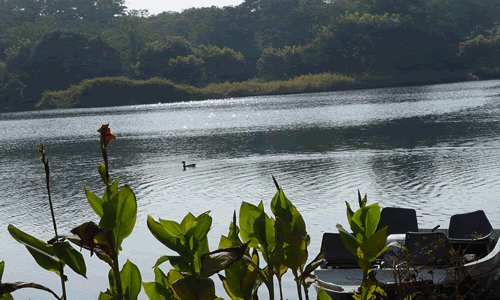|
The
last wilderness

Being the warden's daughter had its perks, it did not
necessarily entail going to the national park to see animals, I literally grew
up with them - an abandoned leopard cub was brought home when she was just a few
days old, a bear that was our house guest for some weeks, a navrang that came
injured and stayed till death did us apart, a gazelle, some monkeys that came
to town to get their ears pierced to wear silver rings that would help in census
later…. Of course, not counting the cows, goats, the dogs and the cats that
walked in and out of our house, not talking of Michel Angelo, though.
Inside Hazaribagh
National Park. The minimalists would have loved this fridge. Dig a hole in the
ground. Fill an earthen pot with water up to its gills and place it in the crater.
Cover it and stack a lot of wet sand on the lid. Not only would the sand act as
a camouflage, it would also drive the heat away. Now use this contraption to keep
cold drinks, lemon, mangoes, just anything that hates the heat. Perhaps
that was my first lesson in minimalism and my first feel of incredible glee. When
Fanta and Thums Up were pulled out of its wide neck, ahmm! It was pure ecstasy!
That delight was our prime reason to go to Hazaribagh National Park, of which
my father was the warden for several years. The park, spread over 72 sq. miles,
had no electricity, no phones, but it was our fiefdom and we loved it. The
improbable fridge was what the national park was - pristine and untouched by man.
The Sal trees were marvelously thick and in it lived a huge crop of sambhar, spotted
deer, bison, rabbits, wolf and a wide variety of orioles, curlews, finches, sparrows
and lapwings. There were leopards and bears too, but of a tiger all I ever saw
was pugmarks cast in plaster of paris and stories of its sightings. Being
the warden's daughter had its perks, it did not necessarily entail going to the
national park to see animals, I literally grew up with them - an abandoned leopard
cub was brought home when she was just a few days old, a bear that was our house
guest for some weeks, a navrang that came injured and stayed till death did us
apart, a gazelle, some monkeys that came to town to get their ears pierced to
wear silver rings that would help in census later…. Of course, not counting
the cows, goats, the dogs and the cats that walked in and out of our house, not
talking of Michel Angelo, though. For some
time, my father had a small quarter inside the park, actually in the middle of
the jungle. A non-descript tiled house with cement floors and windows without
grills, served as our weekend getaway. Invariably, on Saturdays, parents and we
kids, the four of us, would dump essentials in the rickety jeep and drive nearly
28 kilometers inside our jungle house that was surrounded by thick sal trees and
orange balsams that threw in that much-needed gladness. At night, the air would
be laden with the fragrance of wet eucalyptus leaves and the mornings would unwrap
with chirping of the birds. In the middle of
the jungle, 10 kms from the Pokhariya entry point at Patna-Hazaribagh highway,
was the canteen, an island within a man-made lake. The wooden bridge often creaked
after rains and we would run the tiny distance with our eyes closed, asking God
to save us from falling into the moss- burdened water Another
favorite pastime was hoisting huge salt licks (blocks of salt) on tree trunks
to provide that extra zing for the deer family. And one day, out of sheer curiosity,
I dug my nails into the salt lick and actually tasted it. Whoosh! It hit straight,
it was that strong! After that salt licks were left for the deer, while we went
romping after father, an avid photographer, in bushes and marshlands looking for
rare birds. One night, we also sat on a machan, to watch a leopard kill a goat
that was tied to a tree. It was a ploy to provide food to the hungry leopard that
often strayed into the neighboring villages looking for food. I
peeked into childhood and minimalism again when I visited the park a week ago.
There is still no electricity, no phones, no fridges. It still has 43 rooms, with
beds for Rs 75 night. The only addition is the paddleboat that can be hired for
Rs 25 for 20 minutes. The entrance fee has gone up - Rs 80 for a car, Rs 200 for
a bus, one rupee for a cycle while pedestrians can walk in free. The canteen,
that can seat 50 people, still serves dal-rice and vegetable for Rs 20, half a
plate of chicken comes for Rs 35. The number
of animals seems to have dwindled; the park has lost its sheen. The porcelain-skinned
Bengali women who came in busloads earlier have gotten fewer in number; the flowers
have dried, the bridge no longer creaks. My father is old now and Hazaribagh National
Park is no longer my fiefdom. But go there
once; the woods are still gorgeous. And the feeling sheer catharsis! Published
in Discover India magazine, March 2004. |

